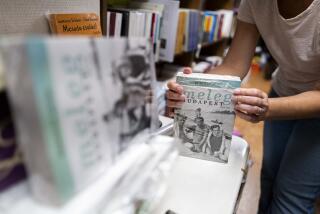Frozen Peas, Carrots -- and Bible
- Share via
MOCHOV, Czech Republic — Just past a room stocked with spinach and peas, music scores written by Wolfgang Amadeus Mozart lie frozen in a factory that until recently concerned itself with nothing but packaging vegetables.
“And there’s the Prague Bible,” manager Vladimir Blaha said, pointing to another shelf in a frigid room stacked with bundles of papers wrapped tightly in plastic. The 1488 edition of the Bible is the first ever printed in the Czech language and is one of just 12 surviving copies.
Until this month, these treasures -- and tens of thousands of other historic books and documents -- were stored safely in the basements of museums, libraries and other cultural institutions throughout Prague.
Then the worst flooding in 175 years caused ground water and sewage to surge into cellars, and the guardians of the nation’s historic treasures had to scramble to salvage what they could.
Putting the soggy materials into the arctic storerooms at the Mochovske Mrazirny company is a time-buying tactic meant to prevent further damage to the documents until officials can find the equipment and resources to restore the paper.
Prague’s municipal library, owner of the 1488 Bible, was the first to seek the company’s help. By late last week, , 18 other institutions also had trucked documents to the factory near Mochov, a village 12 miles east of Prague.
At the factory, a handwritten list on notebook paper tracks the depositors: the National Museum, the Czech Philharmonic Orchestra, the Academy of Science, the former Nazi concentration camp Theresienstadt at Terezin.
The government estimated that damage to cultural sites totaled $73 million, including costs for repairing buildings and restoring documents and the value of destroyed manuscripts.
The director of the municipal library, Tomas Rehak, said he turned to the vegetable company after one of his employees found in researching the Internet that the only solution for saving the soggy documents was to freeze them immediately.
Special equipment will be needed to vacuum out the moisture later.
“We just opened the yellow pages to look for someone with freezing capabilities, and this was the first one,” Rehak said.
“I knew the name from the back of frozen vegetables. Actually, all of us were used to buying these vegetables.”
Rehak phoned the factory to ask whether its managers would be willing to freeze and store 20,000 of the library’s most valuable manuscripts, some several centuries old.
“When I first heard that, I thought, ‘You’re crazy!,’ ” Blaha recalled.
But within five hours, both the factory’s director and the government had approved the emergency plan, Rehak said.
Blaha said health officials later imposed conditions that all papers must arrive sealed in plastic and that they not be kept in freezer rooms with food.
At the factory, workers cart bundles of papers into the freezer unit, a room about half the size of a tennis court and 26 feet high.
It’s not known how long the materials will have to remain frozen.
The Czech minister of culture, Pavel Dostal, said it could take up to 100 years to restore the frozen documents.
But Jana Tomsu, an art restoration expert with the National Museum, said it could even take longer, noting it would take one restorer working alone 5,000 years to repair 20,000 books.
“In my opinion [the freezing] doesn’t make sense. It is only a way of delaying the solution,” Tomsu said. “Nobody has any experience with it here.”
It’s still unclear who will pay Mochovske Mrazirny for the big chill. The emergency measure was made in such haste that there was no time to talk about payment.
“There is an agreement that they will freeze and store our books, but nothing about money,” Rehak said. “We will probably pay something, or maybe the state will pay something. I just don’t know.”
Blaha said the company doesn’t know whether it will be paid anything, but he thinks it deserves something.
“We have no idea how this preservation process works,” he said. “But this stuff could be frozen here for years.”
More to Read
Sign up for Essential California
The most important California stories and recommendations in your inbox every morning.
You may occasionally receive promotional content from the Los Angeles Times.











